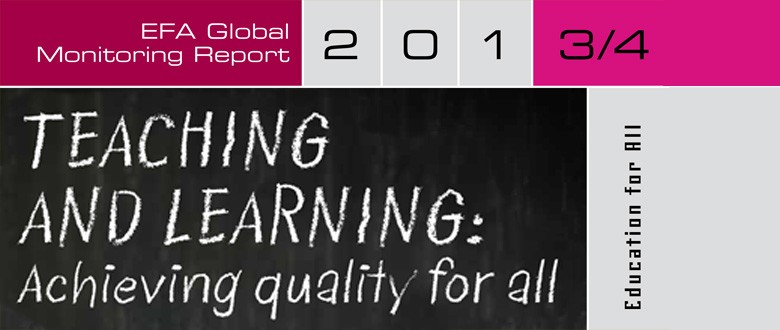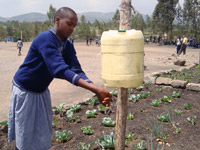
On January 29th 2014, the 2013/4 Education for All Global Monitoring Report - 'Teaching and learning: Achieving quality for all' was launched globally by UNESCO. The report is an annual account of the world’s progress towards meeting its commitment to achieving Education for All. VVOB, the Flemish Association for Development Cooperation and Technical Assistance, receives critical acclaim in this report.
Photo: ©UNESCO/Poulomi Basu
The Education for All Global Monitoring Report
The Education for All Global Monitoring Report, produced annually, is the prime instrument to assess global progress towards achieving the Education for All goals. It tracks progress, identifies effective policy reforms and best practice in all areas relating to Education for All (EFA), draws attention to emerging challenges and seeks to promote international cooperation in favour of education.
The 11th Education for All Global Monitoring Report - Teaching and learning: Achieving quality for all, reveals that by 2015 many countries will not have reached the EFA goals and the global learning crisis is costing governments $129 billion a year. Ten per cent of global spending on primary education is being lost on poor quality education that is failing to ensure that children learn. This situation leaves one in four young people in poor countries unable to read a single sentence. The report concludes that good teachers are the key to improvement and calls on governments to take urgent action to boost teaching through reforms that focus on meeting the needs of the disadvantaged.
UNESCO’s Director-General, Irina Bokova: "Teachers have the future of this generation in their hands. We need 5.2 million teachers to be recruited by 2015 and we need to work harder to support them in providing children with their right to a universal, free and quality education."
VVOB positively recognised
Besides monitoring the progress towards the EFA goals, the report is making recommendations to end the learning crisis. A key strategy is to provide good quality teachers. To achieve this, teacher education should be improved so all children can learn. Teachers’ skills have to be improved through ongoing education, for instance training to adapt to new teaching and learning approaches. It is in this context that VVOB is being mentioned in the report, with a good practice from our one of its programmes:
"The Healthy Learning programme, also in Kenya, uses in-service support to primary school teachers to improve pupils’ understanding of health and nutrition through active teaching and learning methods. The programme, initiated in 2008 by the Ministry of Education in partnership with the Flemish Association for Development Cooperation and Technical Assistance, includes short training workshops, on-the-job support, exchange visits and practical school projects. Rather than changing the curriculum or introducing new topics, it encourages active teaching and learning approaches within the existing curriculum through practical school-based activities, such as school gardens, agroforestry technology, livestock development and water management, making use of locally available resources at school and district levels. The programme, being implemented in 163 public primary schools in disadvantaged arid and semi-arid areas, has been found to be relevant and effective."
(p. 245)

Reacting to the report, Tom Vandenbosch, Education Advisor at VVOB, said: "The report confirms that just getting children into school is not enough to solve the global learning crisis. We need to make sure that all children are getting equal chances for learning, irrespective of gender or background. Good teachers are of course crucial in giving children such opportunities through effective learning process. That is why VVOB and its partners are focusing on teacher development in all of their programmes across the world. The Healthy Learning programme in Kenya provides just one example of how teacher development can indeed change children’s lives. It is nice and encouraging to be recognised in such an important and influential report."




